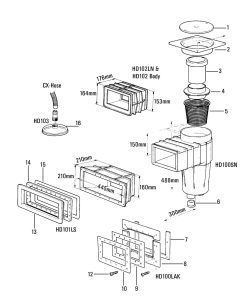Understanding the Legal Requirements for Spa Pool Management
Managing a spa pool involves more than just routine maintenance; it also requires compliance with relevant health and safety legislation. Dutyholders, including employers, operators and those responsible for the premises, must understand their legal responsibilities. This blog post will outline the key legal requirements for spa pool management, drawing on the Health and Safety Executive (HSE) document HSG282 [1, 69].
Key Legislation
Several pieces of legislation apply to spa pool management [69]:
- Health and Safety at Work etc Act 1974 (HSW Act): This act places a general duty on employers and those in control of premises to ensure the health and safety of their employees and others who may be affected by their undertaking [69].
- Management of Health and Safety at Work Regulations 1999 (MHSWR): These regulations require employers to assess risks in the workplace, access competent advice, and establish procedures for serious and imminent danger [70].
- Control of Substances Hazardous to Health Regulations 2002 (COSHH): These regulations require dutyholders to assess, prevent, or control risks from hazardous substances, including biological agents like Legionella [71].
Responsibilities Under the Law
Dutyholders must [69-71]:
- Assess Risks: Conduct thorough risk assessments to identify potential hazards, including exposure to Legionella and other infectious agents [70].
- Implement Control Measures: Implement effective control measures to prevent or control the risks identified [71].
- Provide Competent Advice: Ensure access to competent help and advice to apply health and safety legislation [70].
- Provide Information and Training: Provide employees with adequate information, instruction, and training on risks and control measures [72].
- Maintain Control Measures: Regularly maintain, examine, and test control measures [72].
- Provide Health Surveillance: Provide health surveillance of employees, where appropriate [72].
- Keep Records: Maintain records of risk assessments, control schemes, training and inspections [73, 74].
Specific Requirements
- Risk Assessment: A risk assessment should consider source water quality, the design of the system, potential sources of contamination, and normal operating conditions [43, 61]. The assessment should enable the duty holder to show that all relevant factors have been considered [75].
- Written Control Scheme: A written control scheme should be specific to the spa pool system and should outline operation, control methods, checks, and remedial actions [11, 12]. The scheme is part of the normal operating plan [11].
- Competent Person: Appoint a responsible person to oversee the control of risks, ensuring they have sufficient authority, competence, and knowledge [75, 76].
- Emergency Procedures: Establish emergency procedures, often referred to as the emergency action plan, to deal with serious and imminent danger [67, 77].
Enforcement
The Health and Safety Executive (HSE) and local authorities (LAs) enforce health and safety legislation. The HSE is responsible for designers, manufacturers, and installers, while local authorities are responsible for hotels, retail outlets, and private clubs [78].
Other Relevant Legislation
Additional legislation that dutyholders need to be aware of include:
- Reporting of Injuries, Diseases and Dangerous Occurrences Regulations 2013 (RIDDOR): Requires employers to report certain work-related accidents and diseases, including legionellosis [72, 79].
- Safety Representatives and Safety Committees Regulations 1977 and Health and Safety (Consultation with Employees) Regulations 1996: These require employers to consult with employees on health and safety matters [57].
Key Takeaway
Compliance with health and safety legislation is not just a legal requirement; it’s essential for creating a safe spa pool environment. Dutyholders must understand their responsibilities and proactively implement measures to minimise the risks associated with spa pool operations.
Keywords: Spa Legal Requirements, Hot Tub Legislation, Pool Safety Laws, Health and Safety, Legionella Regulations, Spa Management
FAQs
- What is the Health and Safety at Work etc Act 1974?
- This act places a general duty on employers and those in control of premises to ensure the health and safety of their employees and others who may be affected by their undertaking [69].
- What are the Management of Health and Safety at Work Regulations 1999?
- These regulations require employers to assess workplace risks, access competent advice and establish procedures for emergencies [70].
- What is COSHH and how does it apply to spa pools?
- The Control of Substances Hazardous to Health Regulations 2002 require dutyholders to assess, prevent, or control risks from hazardous substances, such as legionella [71].
- Who is responsible for enforcing health and safety legislation for spa pools?
- The Health and Safety Executive (HSE) and local authorities (LAs) share enforcement responsibilities [78].
- What is RIDDOR and when should I report an incident?
Related Articles
 Certikin 2" Adjustable Inlet - Abs (HD502)
1 ×
Certikin 2" Adjustable Inlet - Abs (HD502)
1 × Waterco Hydrostorm 3-ph 150 1.282kW 24.1m3/hr
1 ×
Waterco Hydrostorm 3-ph 150 1.282kW 24.1m3/hr
1 × Certikin Supa Skimmer Escutcheon Assembly Kit (SPSU10)
1 ×
Certikin Supa Skimmer Escutcheon Assembly Kit (SPSU10)
1 × Certikin 50Mm Metric Slip Plug (HD8M)
1 ×
Certikin 50Mm Metric Slip Plug (HD8M)
1 × Certikin Waet Concrete Cover Plate - (445Mm X 220Mm) (SPC436)
1 ×
Certikin Waet Concrete Cover Plate - (445Mm X 220Mm) (SPC436)
1 × Invertek Optidrive 0.75kW IP20 400V
1 ×
Invertek Optidrive 0.75kW IP20 400V
1 ×
 Waterco Hydrostorm 3-ph 150 1.282kW 24.1m3/hr
Waterco Hydrostorm 3-ph 150 1.282kW 24.1m3/hr  Certikin Supa Skimmer Escutcheon Assembly Kit (SPSU10)
Certikin Supa Skimmer Escutcheon Assembly Kit (SPSU10)  Certikin 50Mm Metric Slip Plug (HD8M)
Certikin 50Mm Metric Slip Plug (HD8M)  Certikin Waet Concrete Cover Plate - (445Mm X 220Mm) (SPC436)
Certikin Waet Concrete Cover Plate - (445Mm X 220Mm) (SPC436)  Invertek Optidrive 0.75kW IP20 400V
Invertek Optidrive 0.75kW IP20 400V 










